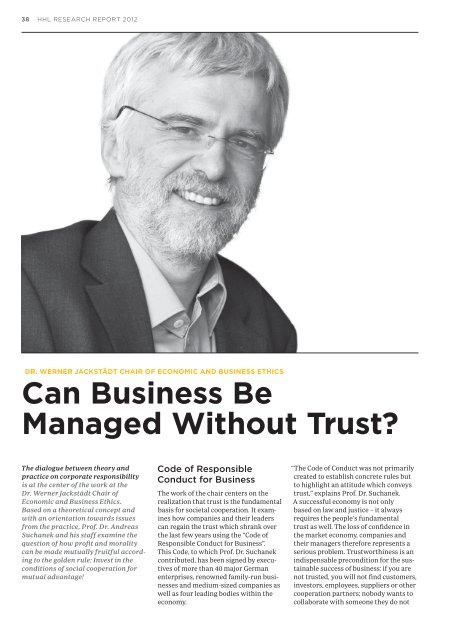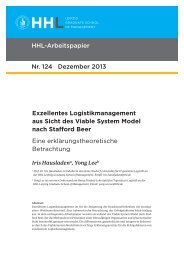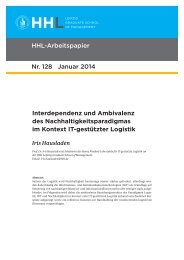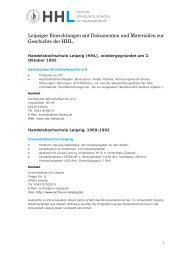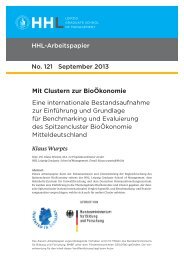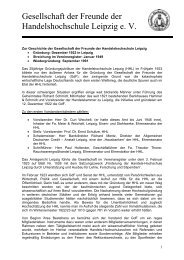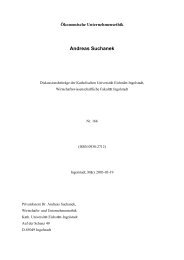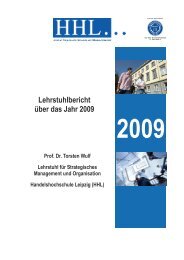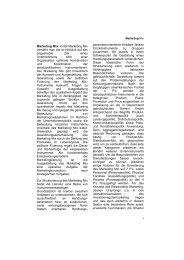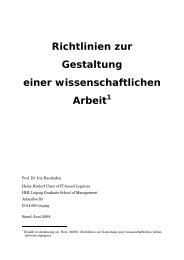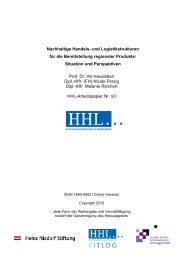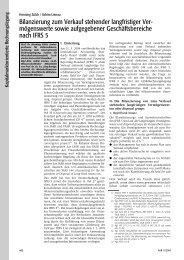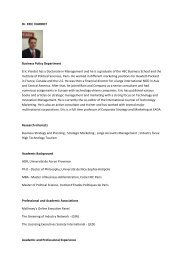Bio- and regenera- tive Medicine as an important growth Market
Bio- and regenera- tive Medicine as an important growth Market
Bio- and regenera- tive Medicine as an important growth Market
You also want an ePaper? Increase the reach of your titles
YUMPU automatically turns print PDFs into web optimized ePapers that Google loves.
38 HHL RESEARCH REPORT 2012 SuSTAinABiLiTY And COMPETiTivEnESS 39<br />
dr. werner JacKStÄdt cHair oF econoMic <strong><strong>an</strong>d</strong> BuSineSS etHicS<br />
c<strong>an</strong> Business Be<br />
M<strong>an</strong>aged without trust?<br />
The dialogue between theory <strong><strong>an</strong>d</strong><br />
practice on corporate responsibility<br />
is at the center of the work at the<br />
Dr. Werner Jackstädt Chair of<br />
Economic <strong><strong>an</strong>d</strong> Business Ethics.<br />
B<strong>as</strong>ed on a theoretical concept <strong><strong>an</strong>d</strong><br />
with <strong>an</strong> orientation towards issues<br />
from the practice, Prof. Dr. Andre<strong>as</strong><br />
Such<strong>an</strong>ek <strong><strong>an</strong>d</strong> his staff examine the<br />
question of how profit <strong><strong>an</strong>d</strong> morality<br />
c<strong>an</strong> be made mutually fruitful according<br />
to the golden rule: Invest in the<br />
conditions of social cooperation for<br />
mutual adv<strong>an</strong>tage!<br />
Code of Responsible<br />
Conduct for Business<br />
The work of the chair centers on the<br />
realization that trust is the fundamental<br />
b<strong>as</strong>is for societal cooperation . It examines<br />
how comp<strong>an</strong>ies <strong><strong>an</strong>d</strong> their leaders<br />
c<strong>an</strong> regain the trust which shr<strong>an</strong>k over<br />
the l<strong>as</strong>t few years using the “Code of<br />
Responsible Conduct for Business” .<br />
This Code, to which Prof . Dr . Such<strong>an</strong>ek<br />
contrib uted, h<strong>as</strong> been signed by execu<strong>tive</strong>s<br />
of more th<strong>an</strong> 40 major Germ<strong>an</strong><br />
enterprises, renowned family-run businesses<br />
<strong><strong>an</strong>d</strong> medium-sized comp<strong>an</strong>ies <strong>as</strong><br />
well <strong>as</strong> four leading bodies within the<br />
economy .<br />
“The Code of Conduct w<strong>as</strong> not primarily<br />
created to establish concrete rules but<br />
to highlight <strong>an</strong> attitude which conveys<br />
trust,” explains Prof . Dr . Such<strong>an</strong>ek .<br />
A successful economy is not only<br />
b<strong>as</strong>ed on law <strong><strong>an</strong>d</strong> justice – it always<br />
requires the people‘s fundamental<br />
trust <strong>as</strong> well . The loss of confidence in<br />
the market economy, comp<strong>an</strong>ies <strong><strong>an</strong>d</strong><br />
their m<strong>an</strong>agers therefore represents a<br />
serious problem . Trustworthiness is <strong>an</strong><br />
indispensable precondition for the sustainable<br />
success of business: if you are<br />
not trusted, you will not find customers,<br />
investors, employees, suppliers or other<br />
cooperation partners; nobody w<strong>an</strong>ts to<br />
collaborate with someone they do not<br />
HB H Hf HB<br />
1 1 1 2<br />
The scheme explains the embeddedness of one’s<br />
actions in time. On one h<strong><strong>an</strong>d</strong> you depend on<br />
given conditions of action (HB1) <strong><strong>an</strong>d</strong> it makes<br />
sense to underst<strong><strong>an</strong>d</strong> them, e.g. with respect to<br />
social relationships <strong><strong>an</strong>d</strong> dependencies; on the<br />
other h<strong><strong>an</strong>d</strong> every action does not only lead to<br />
intended consequences (HF1) but frames also<br />
your own future (HF2) <strong><strong>an</strong>d</strong> the track record<br />
(reputation, trustworthiness) you’ll then have,<br />
respec<strong>tive</strong>ly.<br />
trust . When looking at it that way, trust<br />
is nothing other th<strong>an</strong> <strong>an</strong> investment<br />
in <strong>an</strong> <strong>as</strong>set . Customers or investors,<br />
politici<strong>an</strong>s or administrators, media<br />
representa<strong>tive</strong>s or citizens: they all have<br />
<strong>an</strong> impact on the value-added processes<br />
in comp<strong>an</strong>ies . Therefore, trust plays <strong>an</strong><br />
import<strong>an</strong>t part in all these interactions .<br />
Consistent Actions<br />
For people to consider this attitude<br />
genuine, it must be reflected in the<br />
actions of the decision makers <strong><strong>an</strong>d</strong><br />
their comp<strong>an</strong>ies; words <strong><strong>an</strong>d</strong> deeds<br />
must comply with each other, they<br />
must be perceived <strong>as</strong> consistent . M<strong>an</strong>y<br />
comp<strong>an</strong>ies have initiated a number of<br />
activities <strong><strong>an</strong>d</strong> projects, even strategic<br />
re-orientation, under desig nations such<br />
<strong>as</strong> “CSR”, “social commitment” <strong><strong>an</strong>d</strong><br />
“sustainability” over the l<strong>as</strong>t 20 years<br />
but, according to Prof . Dr . Such<strong>an</strong>ek,<br />
what happens in the core business is<br />
pivotal to credibility . For example: if<br />
credibility is about to be gambled away<br />
by closing down a location which still<br />
makes profit – <strong><strong>an</strong>d</strong> the public perceives<br />
this <strong>as</strong> a “relev<strong>an</strong>t inconsistency” which<br />
undermines trust – it does not help<br />
much to support <strong>an</strong> art project (which<br />
by it self may well be worthy of spon -<br />
soring) . “Against this background, the<br />
systematic causes for the loss of<br />
con fidence must be envisioned in<br />
order to find the right starting points<br />
for me<strong>as</strong>ures in accord<strong>an</strong>ce with the<br />
Code <strong><strong>an</strong>d</strong> avoid unw<strong>an</strong>ted counterproduc<strong>tive</strong><br />
me<strong>as</strong>ures,” concludes Prof . Dr .<br />
Such<strong>an</strong>ek .<br />
The Code therefore seeks to establish<br />
b<strong>as</strong>ic <strong><strong>an</strong>d</strong> generally-accepted guidelines<br />
for responsible conduct in business<br />
from which both expectations <strong><strong>an</strong>d</strong><br />
decisions on business c<strong>an</strong> be drawn .<br />
The main principle of the Code is:<br />
“The wording of<br />
the Code is neither<br />
a law nor a document<br />
defining<br />
binding rules <strong><strong>an</strong>d</strong><br />
monitoring the<br />
compli<strong>an</strong>ce thereof<br />
using precisely determined<br />
criteria“<br />
prof. dr. <strong><strong>an</strong>d</strong>re<strong>as</strong> Such<strong>an</strong>ek<br />
“The economy must promote the public<br />
good .” The leading representa<strong>tive</strong>s of<br />
the economy play a signific<strong>an</strong>t role in<br />
the implementation of this principle<br />
<strong>as</strong> they ac<strong>tive</strong>ly take a st<strong><strong>an</strong>d</strong> on topics<br />
which are import<strong>an</strong>t for the sustainable<br />
continuation of the comp<strong>an</strong>y <strong><strong>an</strong>d</strong><br />
the mainten<strong>an</strong>ce of public trust . “This<br />
Code is not about <strong>an</strong>other new st<strong><strong>an</strong>d</strong>ard<br />
such <strong>as</strong> ISO 26000 or the Germ<strong>an</strong><br />
Sustainability Code by the Germ<strong>an</strong><br />
Council for Sustainable Development .<br />
In fact, it is about execu<strong>tive</strong>s disclosing<br />
their general benchmark for responsible<br />
conduct in business .”<br />
In doing so, the economy h<strong>as</strong> made<br />
society <strong>an</strong> offer of dialogue which<br />
now needs to be subst<strong>an</strong>tiated . One<br />
precondition crucial to success is that<br />
both sides take the thought of dialogue<br />
seriously . On the one h<strong><strong>an</strong>d</strong>, comp<strong>an</strong>ies<br />
must not confine themselves to emph<strong>as</strong>izing<br />
their good deeds <strong><strong>an</strong>d</strong> sublime<br />
principles but must ac<strong>tive</strong>ly take a st<strong><strong>an</strong>d</strong><br />
on the disputed topics . On the other<br />
h<strong><strong>an</strong>d</strong>, representa<strong>tive</strong>s of the public <strong><strong>an</strong>d</strong><br />
civil society must not limit themselves<br />
to merely challenging the trust <strong><strong>an</strong>d</strong><br />
over-simplifying conflicts; instead, they<br />
should take the m<strong>an</strong>agers at their word,<br />
set out their expectations, specify the<br />
criticism through the guidelines of the<br />
Code <strong><strong>an</strong>d</strong> consider the limitations of<br />
how much responsibility businesses c<strong>an</strong><br />
take in the process .<br />
“The wording of the Code is neither a law<br />
nor a document defining binding rules<br />
<strong><strong>an</strong>d</strong> monitoring the compli<strong>an</strong>ce thereof<br />
using precisely determined criteria,”<br />
emph<strong>as</strong>izes Prof . Dr . Such<strong>an</strong>ek . It w<strong>as</strong><br />
developed by the economy – <strong><strong>an</strong>d</strong> not external<br />
influences – to express <strong>an</strong> attitude<br />
<strong><strong>an</strong>d</strong> making it part of a dialogue in the<br />
form of principles <strong><strong>an</strong>d</strong> positions .<br />
www.wcge.org<br />
Dissertations<br />
Martin von Broock wrote about<br />
the “underst<strong><strong>an</strong>d</strong>ing of the game” <strong>as</strong><br />
a category which shows the central<br />
signific<strong>an</strong>ce of individual perception<br />
of societal processes, rules <strong><strong>an</strong>d</strong> situations<br />
<strong>as</strong> a precondition of societal<br />
order . With his work, he adds <strong>an</strong><br />
essential dimension to the existing<br />
terms of “game moves” <strong><strong>an</strong>d</strong> “rules of<br />
the game” .<br />
H<strong>an</strong>s-Christi<strong>an</strong> erdm<strong>an</strong>n‘s thesis<br />
dealt with the responsibility of<br />
media comp<strong>an</strong>ies . The thesis w<strong>as</strong><br />
prepared in cooperation with the Axel-<br />
Springer-Verlag publishing house .<br />
Marcos Sáez obtained his doctoral<br />
degree by examining the question of<br />
trust between b<strong>an</strong>ks <strong><strong>an</strong>d</strong> retail customers<br />
. The fin<strong>an</strong>cial crisis showed<br />
the elementary import<strong>an</strong>ce of trust .<br />
Sáez‘ theses <strong>an</strong>alyzes the challenges<br />
for b<strong>an</strong>ks to invest in this “<strong>as</strong>set” .<br />
J<strong>an</strong> Sammeck submitted collec<strong>tive</strong><br />
self-commitment processes to <strong>an</strong><br />
economic <strong>an</strong>alysis <strong><strong>an</strong>d</strong> identified<br />
central factors of fundamental import<strong>an</strong>ce<br />
for the success or failure<br />
of these processes (possibilities of<br />
me<strong>as</strong>ure ment of cost <strong><strong>an</strong>d</strong> return of<br />
self-commitment, interdependence<br />
of committing actors, <strong><strong>an</strong>d</strong> the cost of<br />
implementation) .<br />
Christi<strong>an</strong> z<strong>an</strong>gs submitted a thesis<br />
on the influence of corporate responsibility<br />
strategies within the context<br />
of mergers & acquisitions <strong><strong>an</strong>d</strong> the<br />
implications that may arise due to<br />
differences in these strategies .<br />
dr. werner JacKStÄdt<br />
cHair oF econoMic <strong><strong>an</strong>d</strong><br />
BuSineSS etHicS<br />
cHair donor<br />
dr. Werner Jackstädt-Stiftung<br />
cHair Supporter<br />
Stifterverb<strong><strong>an</strong>d</strong> für die<br />
deutsche Wissenschaft<br />
cHairHolder<br />
Prof. dr. Andre<strong>as</strong> Such<strong>an</strong>ek<br />
core coMpetencieS/<br />
reSearcH intereSt<br />
• corporate responsibility<br />
• economic <strong><strong>an</strong>d</strong> business ethics<br />
• m<strong>an</strong>agement of trust <strong><strong>an</strong>d</strong> integrity<br />
• methodology of social sciences<br />
• theory of sustainability<br />
contact<br />
www.hhl.de/ethics


